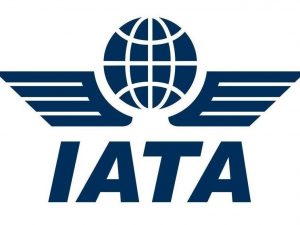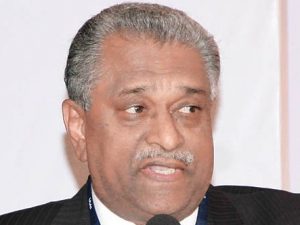India climbed back to the top of the domestic aviation growth chart in May with a 17.7 per cent year-on-year increase, as per IATA’s Air Passenger Market Analysis. This marks the 33rd consecutive month of double-digit RPK growth. However, the very strong upward SA traffic trend has slowed since the unexpected ‘demonetisation’ in November 2016, in line with the wider impact that this looks to have had on economic activity. Business confidence surveys have recovered somewhat in recent months, particularly on the services side. However, the upward trend in domestic RPKs has slowed to an annualised rate of around 7 per cent over the past six months. Year-on-year growth in global RPKs slowed to (a still robust) 7.7 per cent in May, having reached a six-year high of 10.9 per cent in April. Industry-wide RPKs have now grown by 7.9 per cent year-on-year so far this year compared to the same period in 2016. This is equivalent to annual growth of around 8.6% once you allow for the extra day in 2016 on account of it having been a leap year.
Read More »Goh Choon Phong is new IATA Chairman
The International Air Transport Association (IATA) announced that Goh Choon Phong, CEO, Singapore Airlines, has assumed his duties as Chairman of the IATA Board of Governors (BoG) for a one-year term, effective from the conclusion of the 73rd IATA Annual General Meeting (AGM) in Cancun, Mexico. Goh is the 76th Chair of the IATA BoG, and the third CEO of Singapore Airlines to hold this position. Goh succeeds Willie Walsh, CEO of International Airlines Group. Walsh will continue to serve on the BoG and the Chair Committee. “It is an honor to serve as IATA’s Chairman for the coming year. While the industry’s global profitability may be strengthening, there is more work to be done as it is not evenly spread. Security is at the top of the agenda. We must improve our partnership with governments to meet the many emerging threats. Additionally, I will be paying special attention to progressing preparations for the Carbon Offset and Reduction Scheme for International Aviation (CORSIA), driving the modernization of cargo processes, and increasing transaction volumes with the New Distribution Capability. We have a busy year ahead. I look forward to working with Alexandre and his team to represent, lead and serve the airline industry,” said Goh. Goh joined Singapore Airlines in 1990 and held senior management roles in Singapore and overseas before being appointed CEO in 2011. He was President of the 68th IATA AGM which was held in Singapore in 2011 and has served on the IATA BoG since then. IATA also announced the BoG agreed to appoint Akbar Al Baker, CEO of Qatar Airways, to serve for a one-year term as Chairman of the IATA BoG from June 2018, following …
Read More »10.7% growth in global air passenger traffic in April’17 over April’16
Global passenger traffic for April 2017 increased by 10.7 per cent as compared to April 2016, which was the fastest pace in six years, according to data provided by International Air Transport Association (IATA). The international passenger demand in April 2017 rose 12. 5 per cent as compared to April 2016, with all regions recording double-digit year-over-year traffic increases for the first time in 12 years. Total capacity climbed 7.7 per cent and load factor climbed 3.5 percentage points to 81.5 per cent. Demand for domestic travel climbed 7.7 per cent in April compared to April 2016, while capacity increased 6.2 per cent, causing load factor to rise 1.2 percentage points to 83.0 per cent. All markets reported demand increases with the exception of Australia, which showed a 2.1 per cent decline. IATA attributed the strong performance to a pick-up in global economic activity and lower airfares. After adjusting for inflation, the price of air travel in the first quarter was around 10 per cent lower than in the year-ago period and it was estimated that falling airfares accounted for around half the demand growth in April. However, it was also noted that the cabin ban on the carriage of large portable electronic devices (PEDs) from 10 Middle Eastern and African airports to the US seemed to have weighed down Middle East-North America passenger traffic. “April showed us that demand for air travel remains at very strong levels. Nevertheless there are indications that passengers are avoiding routes where the large PED ban is in place. As the US Department of Homeland Security considers expanding the ban, the need to find alternative measures to keep flying secure is critical. If the …
Read More »Passenger demand hits 5-year peak in January
The International Air Transport Association (IATA) announced global passenger traffic results for January 2017 showing demand (revenue passenger kilometers) rose 9.6% compared to January 2016. This was the strongest increase in more than five years. Domestic air travel climbed 9.9% in January year-on-year. India led domestic all markets in year-to-year growth for the 22nd month in a row; January traffic soared 26.6%, marking the 15th consecutive month of 20%-plus annual growth. Demand is being stimulated by strong flight frequency. Capacity increased 8.7% and load factor was 80.1%, up 0.9% percentage points. January international passenger traffic surged 9.3% compared to the year-ago period. Capacity rose 7.5% and load factor climbed 1.3 percentage point to 80.3%. All regions recorded year-over-year increases in demand led by the Middle East and Asia Pacific. Asia Pacific carriers recorded an increase of 10.9% compared to January 2016, helped by the impact of Lunar New Year-related travel and solid growth on routes within Asia. Capacity rose 8.9%, pushing up load factor 1.5 percentage points to 81.4%. “2017 is off to a very strong start, with demand at levels not seen since 2011. This is supported by the upturn in the global economic cycle and a return to a more normal environment after the terrorism and political ‘shock’ events seen in early 2016,” said Alexandre de Juniac, IATA’s Director General and CEO. IATA estimates the holiday-related travel contributed up to one-half a percentage point in extra demand growth. January capacity rose 8.0%, and load factor climbed 1.2 percentage points to 80.2%. IATA (International Air Transport Association) represents some 265 airlines comprising 83 per cent of global air traffic.
Read More »Travelport becomes first GDS to receive IATA’s NDC Aggregator certification
Travelport announced that it has become the first GDS to be granted with both ‘Aggregator Level One’ certification and ‘IT Provider Level Two’ status by the International Air Transport Association (IATA) as part of its New Distribution Capability (NDC) programme. For airlines, this means that Travelport is able to fully integrate with its NDC application programme interface should the airline choose to use NDC-XML messaging to distribute and deliver their fares and products. For travel agencies and travel management companies, this means that when shopping for and booking flights via Travelport’s Travel Commerce Platform, they will have even more enhanced travel content and greater access to ancillary offers. In particular, Travelport-connected agents will be able to make ancillary sales post the original flight booking, and through their preferred agency workflows, for the first time. Travelport has also achieved the NDC-capable ‘IT Provider’ Level Two status, making it only the second organisation—and first GDS–ever to be designated as NDC certified and NDC Capable. This further expands its NDC capabilities and means that Travelport also has the option to distribute IATA NDC offers for fares and prices on behalf of the airlines electing to use IATA’s industry standards.
Read More »India’s domestic aviation market records highest growth in 2016
The domestic India market topped the growth chart for the second year in a row according to IATA’s full-year global passenger traffic results for 2016. Passenger volumes surged by 23.3 per cent in 2016 – twice as fast as the next fastest growing market, China. Although the trend slowed down due to demonetisation, airlines are scheduling strong flight frequency growth in 2017, which will translate into time savings for passengers and will have the same stimulatory impact on demand as a cut in fares. India recorded revenue passenger kilometre (RPK) expansion of 23.3 per cent and has been underpinned by additional routes and increasing flight frequencies. “Air travel was a good news story in 2016. Connectivity increased with the establishment of more than 700 new routes. And a $44 fall in average return fares helped to make air travel even more accessible. As a result, a record 3.7 billion passengers flew safely to their destination. Demand for air travel is still expanding. The challenge for governments is to work with the industry to meet that demand with infrastructure that can accommodate the growth, regulation that facilitates growth and taxes that don’t choke growth. If we can achieve that, there is plenty of potential for a safe, secure and sustainable aviation industry to create more jobs and increase prosperity,” said Alexandre de Juniac, IATA’s Director General and CEO. Asia Pacific carriers recorded a demand increase of 8.3 per cent in 2016 compared to 2015, which was the second-fastest increase among the regions. This pace is considerably ahead of the five-year growth average of 6.9 per cent. Capacity rose 7.7 per cent, pushing up the load factor 0.4 percentage points to 78.6 …
Read More »PNR data to be submitted to Indian Customs
Albert Tjoeng, Assistant Director, Corporate Communications, Asia Pacific at International Air Transport Association (IATA), takes heart from the Union Budget. “The Finance bill 2017 has added new provisions for the future introduction of submission of PNR data by airlines to the Indian Customs, he says. He adds that IATA hopes that the established global standards for transmission of PNRGOV data would be adhered to. “We would also urge that stakeholder consultations precede the development of any regulations detailing the form and data elements for this information,” he concludes.
Read More »India dominates domestic airline growth chart
According to IATA, India has topped the domestic growth chart for the 11th consecutive month with a 22.7 per cent year-on-year traffic growth in October, supported by significant growth in real consumer spending and increases in the number of airport pairs served. Asia-Pacific airlines’ traffic rose 7 per cent in October compared to the year-ago period. Capacity rose 7.1 per cent and load factor dipped 0.1 percentage point to 76.9 per cent. The strong upward trend in seasonally-adjusted traffic has slowed in recent months, although it is too soon to determine whether this is an actual weakening or just a brief pause. On the other hand, the Asia-to-Europe market, which is highly sensitive to shock events, is continuing to recover.
Read More »‘Illegal implementation of BSP Link charges in India’
IATA-accredited travel agents all over India will soon be receiving invoices from IATA for the annual additional amount of $360 towards usage of the 2-tier BSP Link Access that is being implemented effective January 1, 2017. IAAI has contended that, though it is required under IATA Res. 818g, the new BSP Link charges in India have not been listed through the agenda and neither discussed or approved nor recommended by the APJC-India as per the IATA procedures. Hence IATA’s decision to charge $30 per month is totally illegal, arbitrary and unacceptable to the Indian Travel Agents Fraternity, said Biji Eapen, National President, IAAI National Board in an official release. Eapen affirms that IAAI will go “the whole nine yards” and attempt to get a reversal on this unwarranted action by IATA. On November 15, IAAI has communicated to the IATA Regional Director at Singapore requesting to take suggested actions immediately. The Government of India authorities and Ministry are also being alerted and notified on this subject matter. IAAI has been the only Travel Trade Association that has risen to the occasion on behalf of the IATA-accredited Travel Agents in India – as in the matter of getting the Rs.20 lakhs Minimum Guarantee withdrawn in 2002, in getting the High Court of Kerala and the DGCA to issue Orders mandating Travel Agency commission, in getting IATA to invoke force majeure for the BSP payment by Tamil Nadu Travel Agents during the thunderstorm calamity in Nov/Dec 2015 and, recently, in retaining the Insurance Guarantee system actively as the only alternative to the Joint Bank Guarantee system.
Read More »India records double digit growth in domestic passenger demand in Sept
India and China continued to register double-digit growth in domestic passenger demand in September 2016, according to International Air Transport Association’s (IATA) global passenger traffic report. The results showed that global demand, measured in revenue passenger kilometers (RPKs) grew 7 per cent compared to the same month in 2015. This was the strongest year-over-year increase in seven months. Capacity climbed 6.6 per cent and load factor edged up 0.3 percentage points to 81.1 per cent. Growth in domestic traffic slightly outpaced growth in international traffic. Domestic passenger demand climbed 7.2 per cent in September as compared to September2015, which was up from the 4.1 per cent year-on-year growth recorded in August. International RPKs climbed 6.9 per cent with airlines in all regions recording growth compared to 2015. Total capacity climbed 7.2 per cent, causing load factor to slide 0.2percentage points to 80.4 per cent. “September’s growth in passenger demand was healthy. Importantly, this rebound from August weakness suggests that travel demand is showing its resilience in the aftermath of terror attacks. We must, of course, be ever-alert to the ongoing terror threat. And overall the industry is still vulnerable to being buffeted by rising geopolitical tensions, protectionist political agendas, and weak economic fundamentals. This will still be a good year for the airline industry’s performance, but our profitability will continue to be hard-won,” said Alexandre de Juniac, Director General and Chief Executive Officer, IATA.
Read More » Tourism Breaking News
Tourism Breaking News




